25th Anniversary Four-Part Mini Series Event
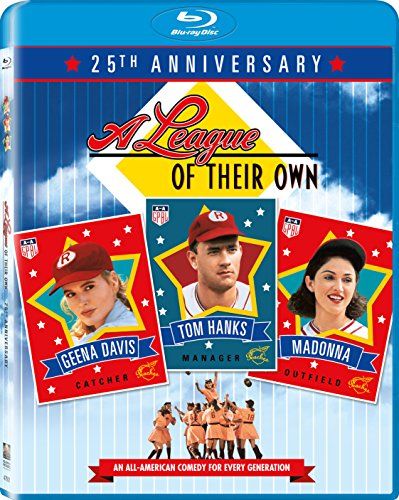
Welcome sports movie fans. Or, in a pinch, actressexuals who will watch largely female casts do practically anything.
Twenty-five years ago on July 1st, 1992, Penny Marshall's period comedy A League of Their Own (1992) opened in theaters. It wasn't quite an immediate blockbuster but word of mouth was spectacular -- in its second weekend it grossed practically as much as its first, which as you know is exceedingly rare. The female led comedy proved another home run for the director of Big, eventually grossing over $100 million domestically. It ended 1992 as that year's tenth biggest hit, just behind Basic Instinct and shutting Clint Eastwood's Unforgiven out of the moneyed top ten.
For the next few days we'll be revisiting this beloved classic tag-team style like we did with Who's Afraid of Virginia Woolf (1966), Thelma & Louise (1991), Rebecca (1940), and The Silence of the Lambs (1991). Please join in the conversation if you love this movie (and who doesn't?). - Editor
Batter up...
Part 1 by Lynn Lee
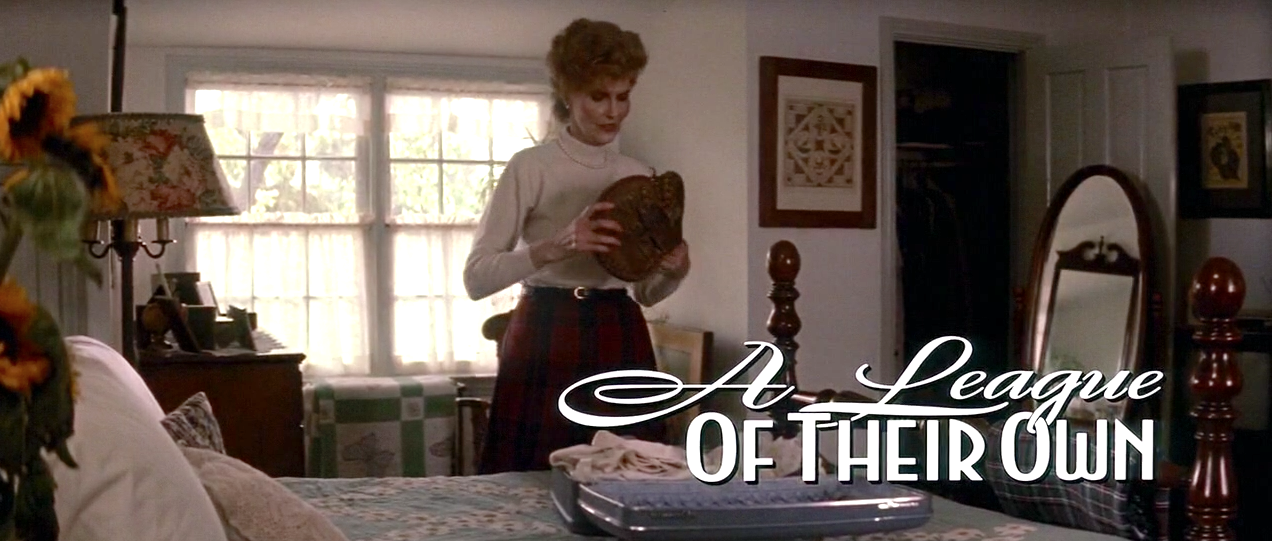
01:22 Inside an old-fashioned cape-cod house, a tall, slender, elegant older lady with reddish blonde hair (Lynn Cartwright, but with Geena Davis’ unmistakable throaty voice dubbed) is packing a suitcase. As we’ll learn, she’s Dottie Hinson, one of the (fictional) first women to play in the (real) All-American Girls’ Professional Baseball League, and is getting ready to attend a special event honoring the AAGPBL at the baseball Hall of Fame. She seems oddly less than excited about it, even when her daughter turns up with her old baseball mitt...
01:50 Dottie abruptly announces that she isn’t going. Daughter Margaret isn’t having it, despite Dottie’s protestations that no one will remember her, that her younger sister Kit won’t be there (with some shade thrown at Kit’s “traveling” ways and “that husband of hers”), and that baseball “was never that important to me.”
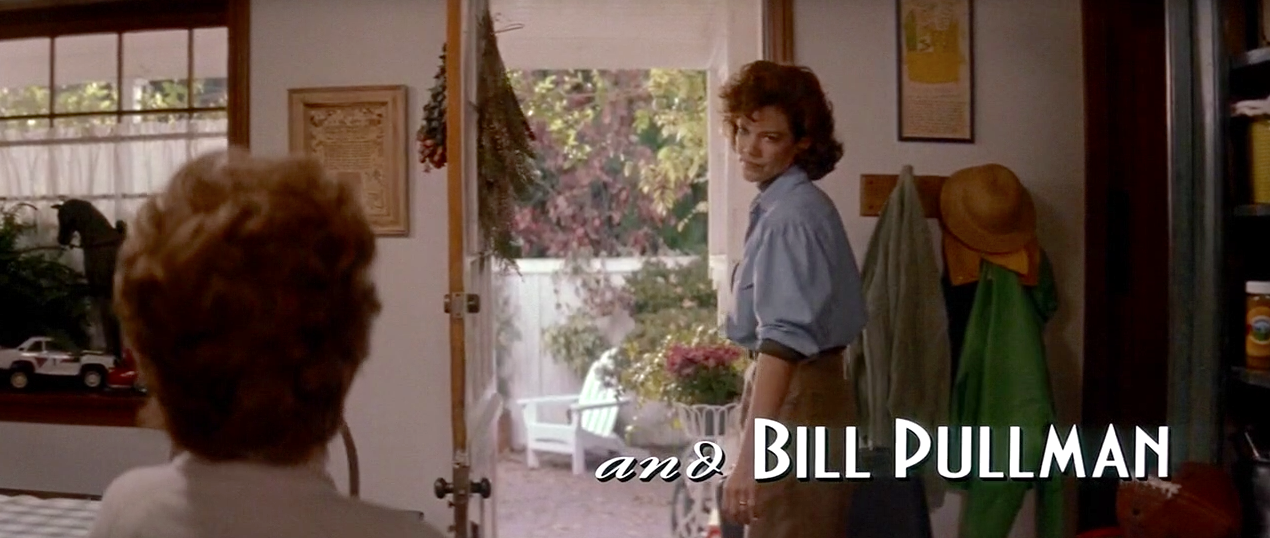
This whole exchange is suspense-free – we know Dottie’s going. But it prefigures the two principal themes that will play out over the course of the film: the tension between Dottie and her more adventurous younger sister, and Dottie’s own ambivalence – or is it simply denial? – about just what baseball meant to her.
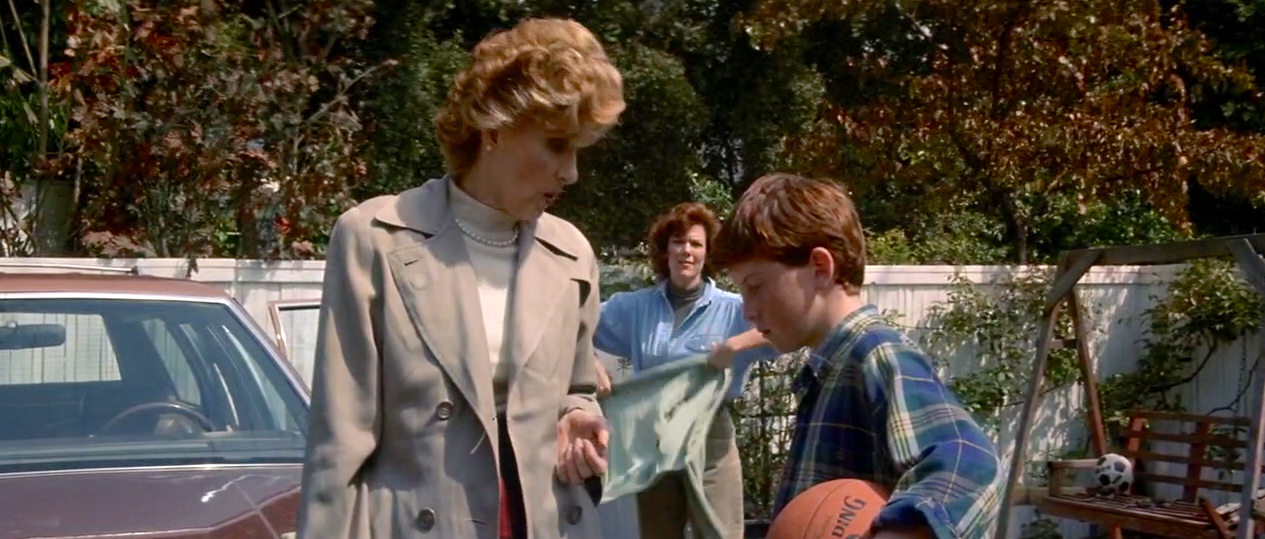
03:10 The little boys we glimpsed playing basketball outside turn out to be Dottie’s grandsons. More heavy foreshadowing as Dottie calls the older one over first, reminding him that his brother is littler than he is and to “give him a chance to shoot,” then calls over the younger one with a much simpler edict: “Kill him.”
03:45 On cue, Carole King pipes in...
Now and forever, you are a part of me / And the memory cuts like a knife 🎵”
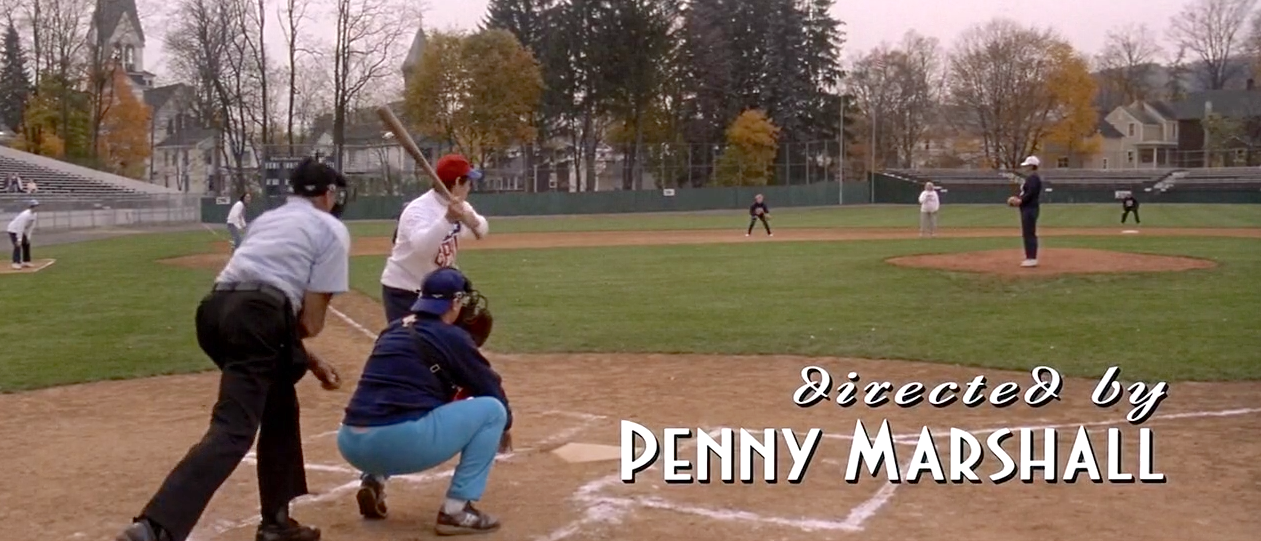
Not subtle, but it works. Like the movie as a whole.
04:35 Dottie arrives at Cooperstown and walks out on a field filled with older women – some in the bleachers, others playing ball as if they were still in their 20s. The sight brings a slight smile to Dottie’s face and triggers a flashback…
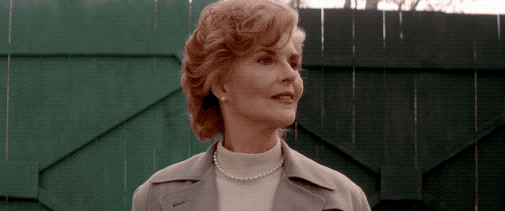 dissolve to flashback!
dissolve to flashback!
05:45 …to 1943. We learn from newsreels that all the major league baseball stars are going off to fight the Nazis, while Chicago team owner and candy magnate Walter Harvey (Garry Marshall) and his right-hand man Ira Lowenstein (David Strathairn) try to figure out a way to keep baseball going in their absence.
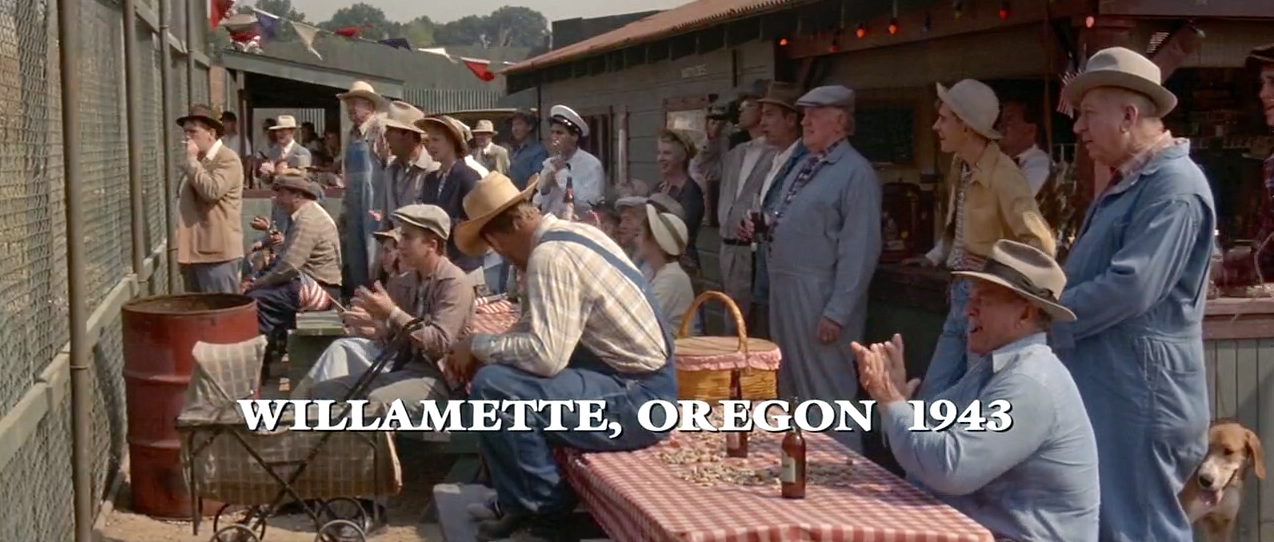
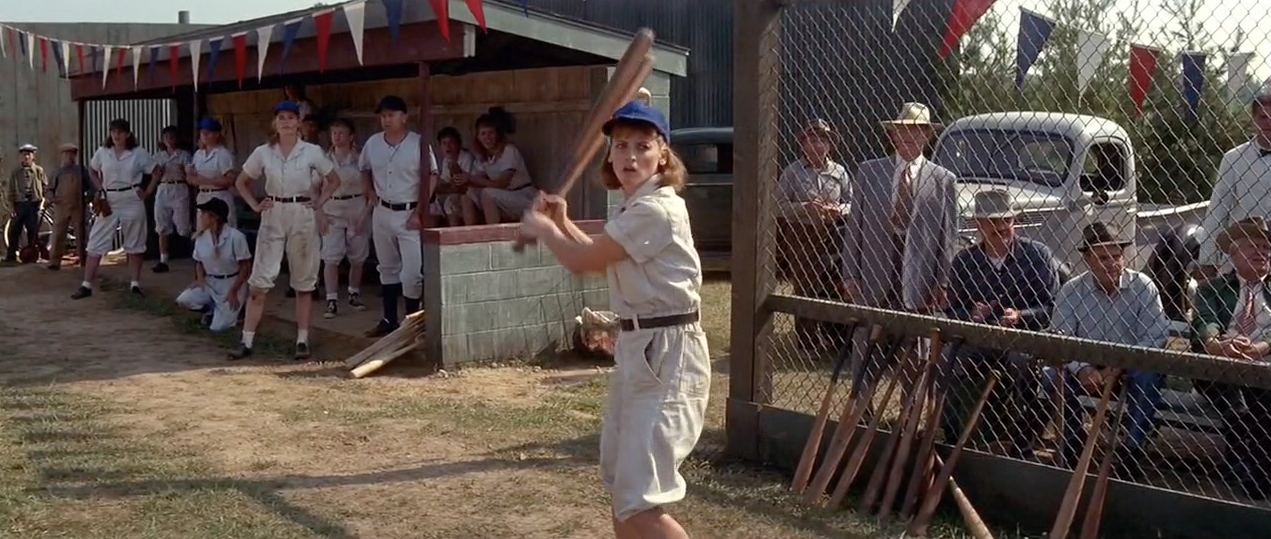
06:33 Cut to a local baseball game in Williamette, Oregon, looking like something out of a Norman Rockwell painting. We see Kit (Lori Petty) on deck; Dottie’s in the background, while a bored baseball scout (Jon Lovitz) sits in the bleachers. Dottie doesn’t stay in the background long, though, as she runs up to give Kit advice (“Don’t swing at that pitch,” “That bat’s too heavy,” “No high ones”) as unwanted as it’s probably correct. Torn between ignoring it and second-guessing herself, Kit strikes out.
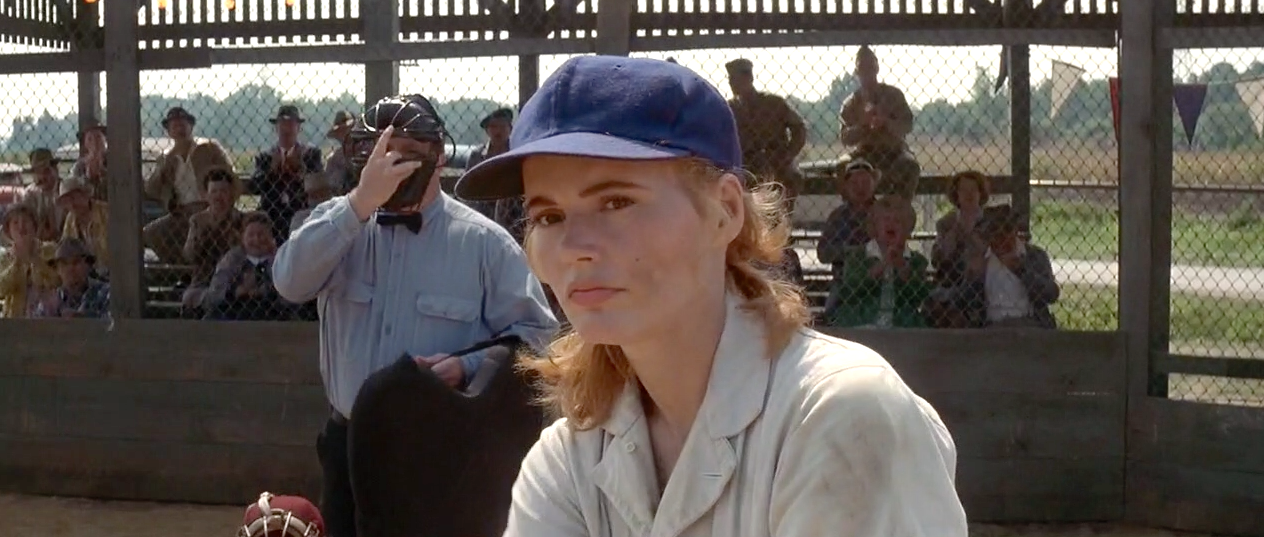
08:40 Dottie, the next batter up, is all business, her casually tied-back hair and the smears on her cheek doing nothing to hide how gorgeous she is. She hits the walk-off home run, of course, winning the game. But her attention immediately reverts to a morose Kit being heckled for letting her sister “bail her out.”

10:20 Walking home to their dairy farm, Kit seethes with jealous resentment towards her perfect sister. This smacks a bit of a Jan Brady “Marcia, Marcia, Marcia” dynamic, except that Dottie’s clearly concerned and sorry for Kit—and yet, still competitive despite herself. Tellingly, when Kit tries to walk faster than her, Dottie won’t let her – she has to race and beat her to the house.
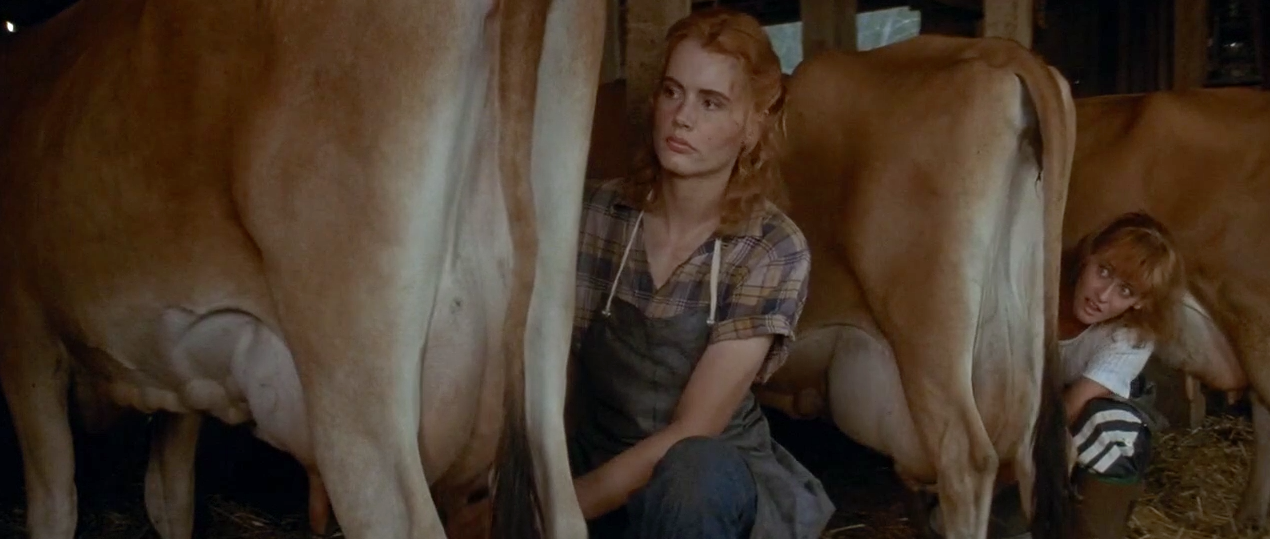
13:00 The scout, Ernie, enters the barn where the girls are milking cows. Every line out of his mouth, mean as it is, has me in stitches. Between insults, he reveals he’s recruiting for the first-ever professional girls’ baseball league. Kit lights up immediately, but Dottie, unimpressed, professes to be content where she is, happily married and running the dairy.

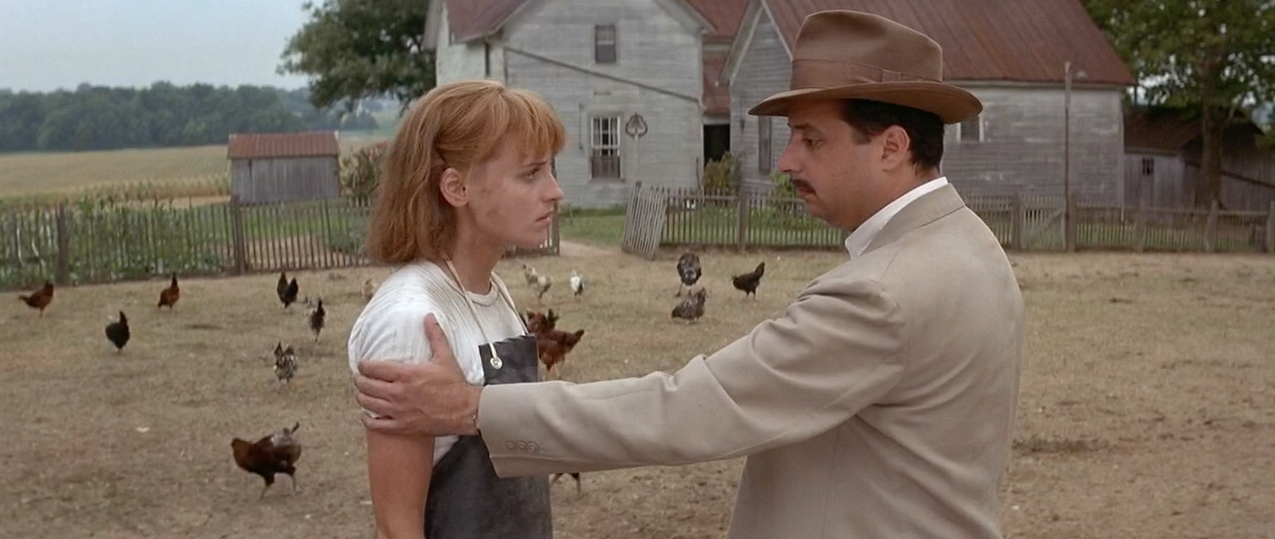
14:08 The scout only wants Dottie, even though she and Kit try to convince him that Kit’s pitching abilities are worth a look. Eventually, he agrees that if Kit can get Dottie to try out, she can come along, too.
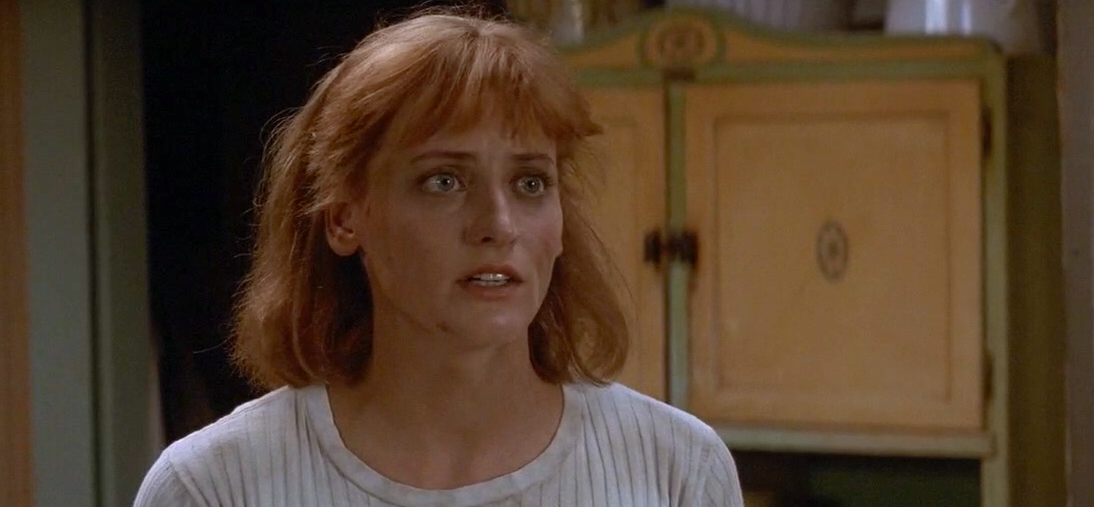
I gotta get out of here. I'm nothing here.
15:15 Kit puts the hard sell on Dottie – doesn’t she want to be able to say she did something special? But it’s her forlorn admission that she “gotta get out of here. I’m nothing here” that finally convinces Dottie to go. However you feel about Kit (I initially found her grating, but grew more sympathetic towards her as I got older), Petty does a fine job conveying her raw hunger and desperation to get away from the farm and out of Dottie’s shadow.
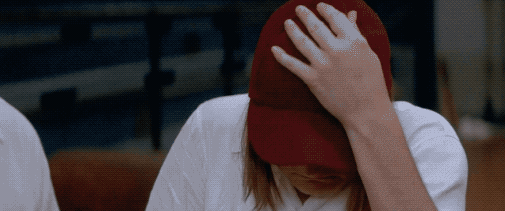
17:50 Ernie stops to check out another prospect, Marla Hooch (Megan Cavanaugh), a powerful switch-hitter whose only flaw is her homeliness. Cavanaugh’s physical acting is actually pretty impressive here, if exaggerated for comic effect: through body language and facial expressions, she makes Marla look plainer, more hunched, and more awkward than she really is. Ernie’s reaction to her close-up is predictably cruel. But Dottie and Kit, united for once, won’t go if Marla doesn’t join them. Female solidarity for the win!
19:30 Marla’s father (Eddie Jones) pleads with Ernie, blaming himself for raising her like a tomboy after her mother died. It’s an old cliché with sexist underpinnings, but Jones sells it effectively; you really believe the sadness and love in his eyes.
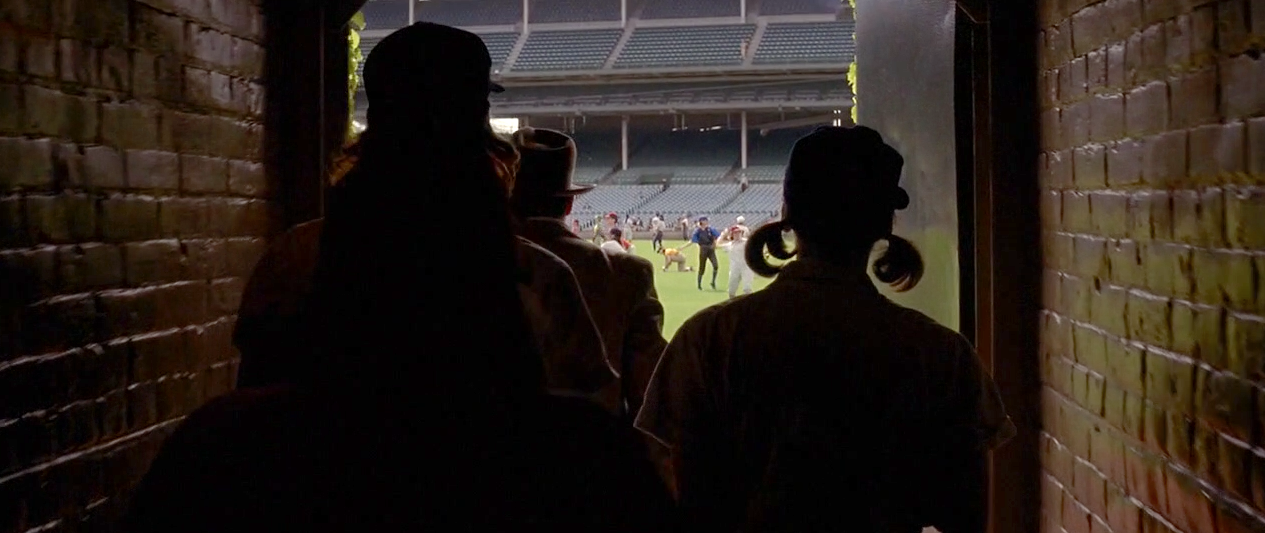
21:55 Chicago! Anticipation builds with the camera tracking Dottie, Kit, and Marla from behind as they walk through the tunnels, so that when they finally emerge on Harvey Field, it looks ENORMOUS.
Hey cow girls, see the grass? Don't eat it!
They’re also pleasantly surprised when Ernie bids them adieu. I’d say his exit is more our loss than theirs, except that it isn’t. Lovitz, while hilarious, is best in small doses, and we get exactly the right amount of him here.
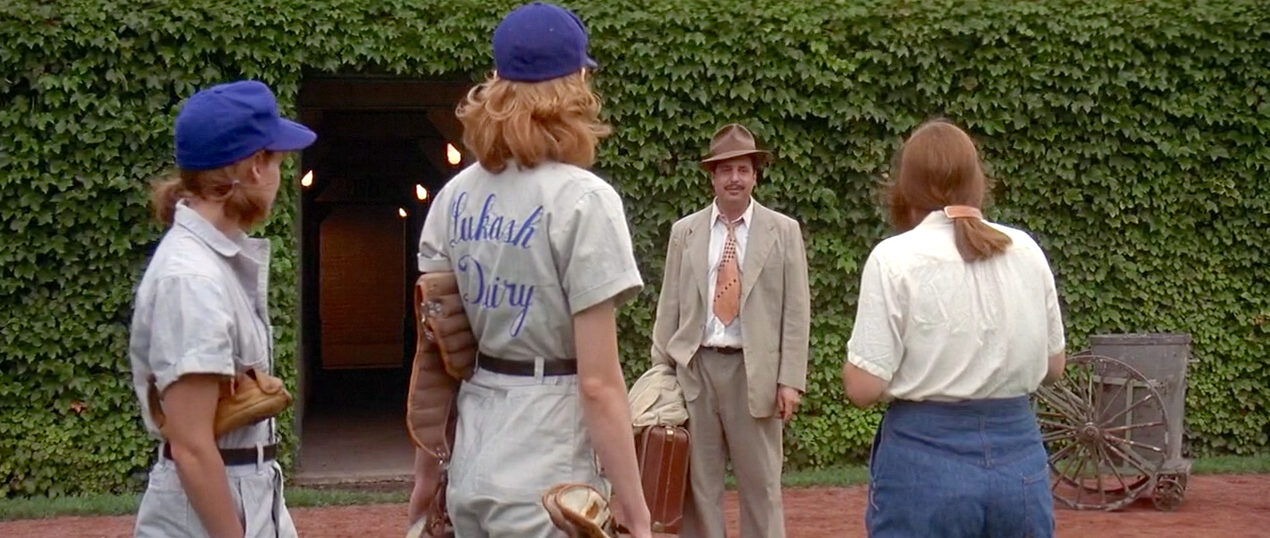
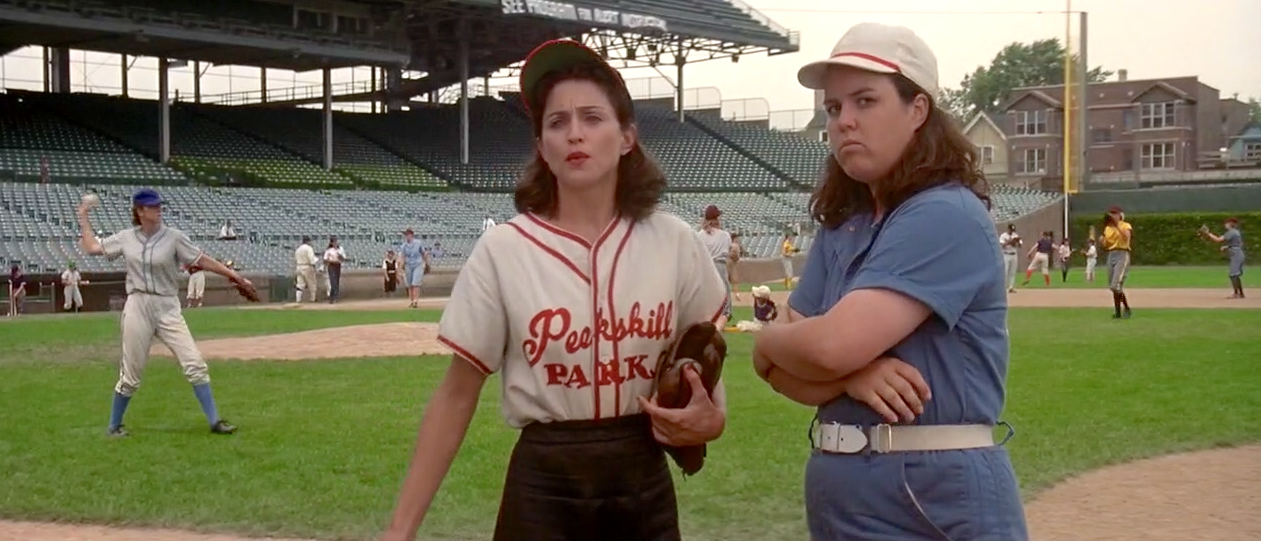 Exit Jon Lovitz. Enter Madonna & Rosie. The movie never leaves you hanging for laughs
Exit Jon Lovitz. Enter Madonna & Rosie. The movie never leaves you hanging for laughs
22:55 You know the movie’s shifted into a higher gear when Rosie O’Donnell and Madonna enter as the worldly, wisecracking New Yawkers, Doris and Mae. Their chemistry is palpable from the get-go, even in their bickering, but especially when they join forces to size up the new girls. Kit, not realizing their trash-talking is mostly a cover for their own nervousness, provokes Doris to hurl a ball at her face…
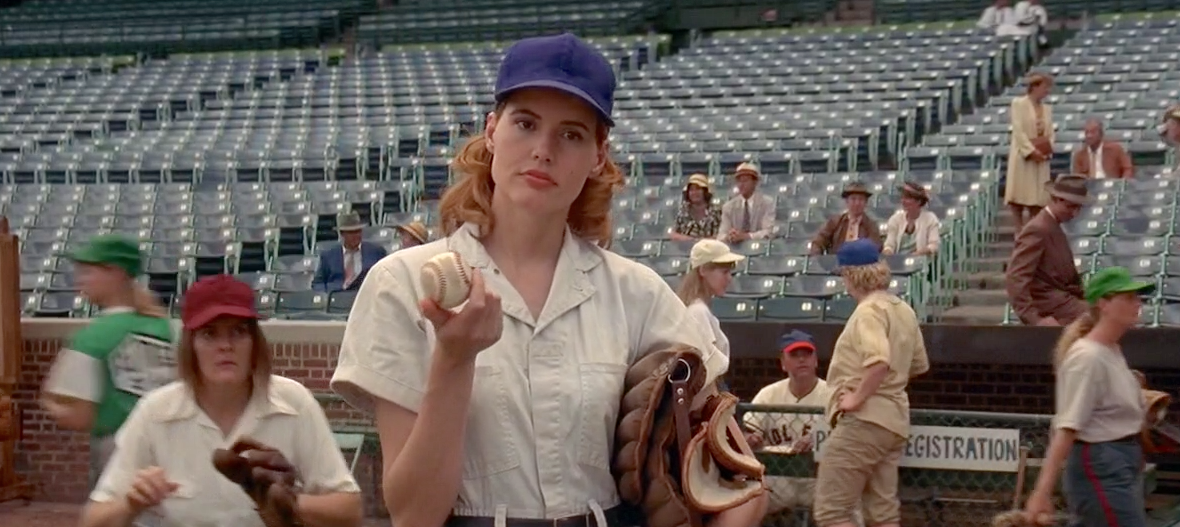
24:00 …which Dottie catches bare-handed with a look that would cow Gengis Khan and that causes Doris and Mae to revise their opinions very quickly.
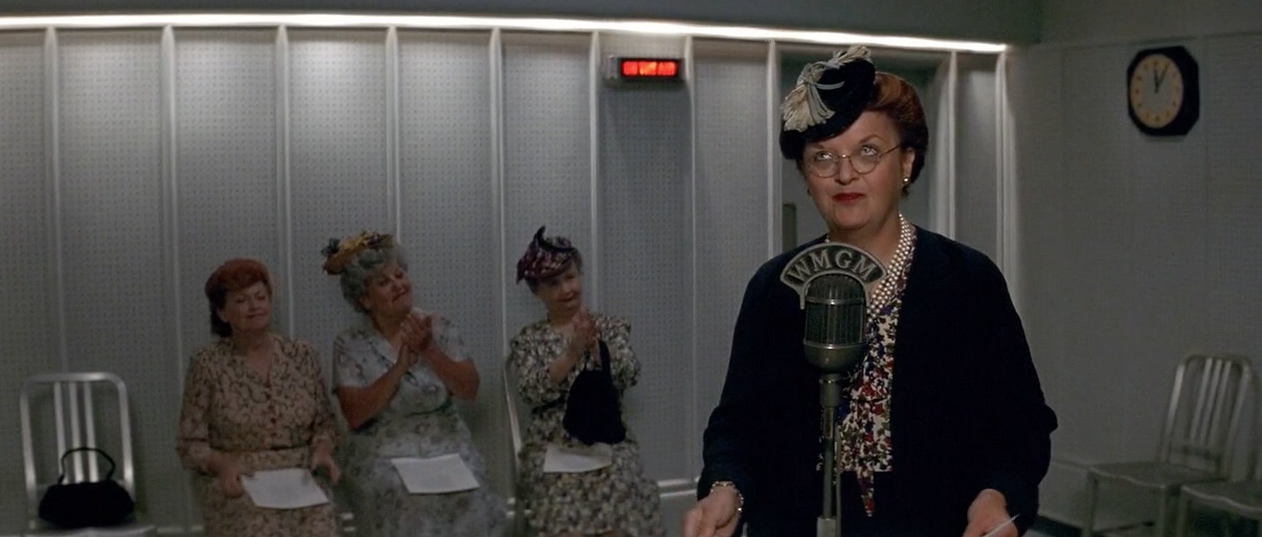 Miss Gillespie has a whole series of "social commentaries". Would watch.
Miss Gillespie has a whole series of "social commentaries". Would watch.
24:29 One of my favorite sequences, as an appropriately pinched-looking lady’s radio lament about the war’s “masculinization” of women, exemplified by the “disgusting” phenomenon of “women’s BASE-BALL,” segues into its own rebuttal—a gloriously energetic athletic montage of the AAGPBL training and tryouts.

26:33 The team rosters are up! Dottie and Kit both made the cut, and they’re on the same team (table whether that’s a good idea, for now), the Rockford Peaches, along with Doris and Mae, Helen Haley (Anne Ramsay, exuding calm compassion) and Shirley Baker, who can’t read but can play ball. They all look so bright and hopeful that…

If you can't play ball in this, you can't play ball with us.
28:40 …we’re due for a deflating reminder that sexism is still alive and well, with the first sight of the uniform they’re expected to wear. The girls’ responses are withering (“That’s a dress, “It’s half a dress,” “What do you think we are, ballplayers or ballerinas?”) but futile: the skirt’s non-negotiable. Also non-negotiable: no smoking, no drinking, and no men—nearly prompting a walkout from Mae—and “charm and beauty” school.
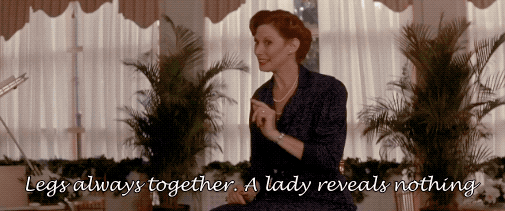
29:46 The sexism is almost worth it for the absurd comic spectacle of those charm school lessons, from how to sashay (“grace-fully and grand-ly”) to how to sip (“don’t slurp”) to how to sit (“legs always together – a lady reveals nothing”). The recurring visual punchline is the round-eyed stare and squat ungainliness of Marla Hooch, which we shouldn’t laugh at but it’s impossible not to. Don’t worry about Marla, though – she’ll turn out fine. Bonus: see if you can spot a very young Téa Leoni as one of the non-Peach baseball players.
31:20 Candy-man Harvey taps former baseball star Jimmy Dugan to coach the Peaches. Tom Hanks looks so young here, it’s hard at first to buy him as a washed-up alcoholic ball player. He has to work even harder to be unlikable, but succeeds, underscoring Jimmy’s arrogance in his reaction to the idea of coaching a women’s team.
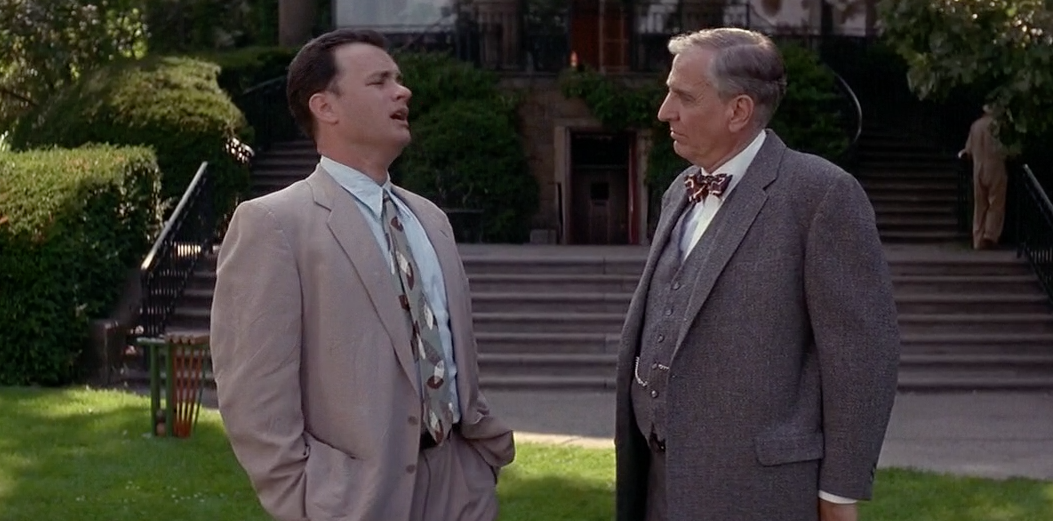
He’ll learn to sing a different tune – but not for a good while yet…
Part 2 with Nathaniel tomorrow